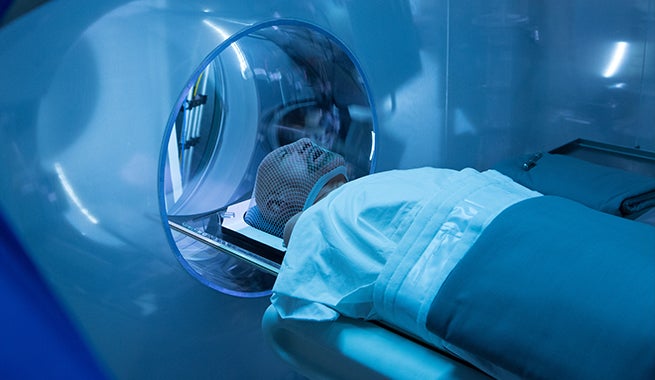So, you want to swap your consciousness to another body once the body you’re living in gets old and frail, do you?
Videos by ComicBook.com
According to Self/less, that’s possible. The new film from Focus Features finds Damian (Ben Kingsley) healthy in the mind but trapped in a failing body. The solution is simple: transfer his mind to a healthy body. Of course, it’s not all lollipops and gum drops after the transfer but you’ll have to see Self/less to find out how that goes for Damian.
But have you ever thought about whether or not something like that is possible? If you have, you’re not alone. Transferring and out right creating consciousness have been a prominent theme in movies, lately, and in only 2015 we have at least three: Chappie, Avengers: Age of Ultron, and soon Self/less. At a recent press event for Self/less, I had the opportunity to sit down with Dr. Charles Higgins, a professor in neuroscience and engineering with a Ph.D from the California Institue of Technology for what was the most interesting interview I’ve ever been a part of.
Right off the bat, Higgns explained that transferring consciousness, as will be seen in Self/less, is not too far off. “In time, it will be possible,” he says. “Fundamentally, what we call the self, the mind, in my opinion, is an emerging phenomenon from the interaction of a bunch of neurons via other cells in the body, the brain. All that put together is your self. There’s nothing more to it than that. When we understand how that all works, we should be able to reproduce it in a computer and then transfer it to another body.” Mind blowing, right? That is practically creating immortality.
Trying to get a better understanding of how any of this science stuff works and what consciousness is, I asked Dr. Higgins about how the process would begin. Would consciousness have to be materialized? Is it energy? A system? ” I’m thinking of it as information,” Higgins explained, adding “I don’t think of it as energy although neurological activity moving about is energy and there is energy moving about our brains and our bodies, but it’s not disembodied energy.” He went on to simplify his explanation a bit with a metaphor, saying the brain is “a computation device,” and comparing it to an iPhone. “It’s running some software. It has hardware. You’d like to create those pieces without scanning it in such detail. So, if I understood, it’s a computer than supports this instruction set, I can write a simulator for it on my computer.”
As for which of the movies that has come along in recent years Dr. Higgins finds most plausible, it’s Transcendence, though the A.I. of Age of Ultron also seems like a possibility. “Here’s how I see it happening,” Dr. Higgins began, “First, we’re likely to have a reasonably good artificial intelligence in a computer. We’ll probably try to figure out a way to map a person’s self, their mind, onto an A.I. in such a way that they are transferred into the computer. I think that’s how it happens first.”
“I see something like Transcendence being the next step and I could see that happening in the next century,” Dr. Higgins. claims. The next century! There’s a chance I may live forever, after all! “This is not something that humans are gonna give up on. Humans have been dreaming of immortality since humans were human. Dreams of being greater than we are. Those are dreams we’re not giving up on. Those aren’t going away. As long as we’re alive, we’re pursuing this goal. Unless we destroy ourselves in some sort of nuclear cataclysm, which is looking less likely than it was 30 years ago, then we will get there,” Higgins concluded.
For a consciousness swapping experience and a look at the costs, be sure to check out Self/less in theaters July 10.









